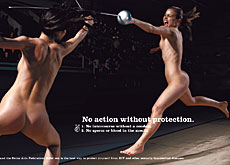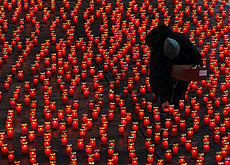Nude fencers get point across in Aids advert

The latest government Aids campaign shows men and women doing a range of dangerous activities completely naked and has the logo "No action without protection".
The second “Love Life – Stop Aids” campaign, which is launched on Tuesday evening and again uses humour to convey a positive message, comes as the Federal Health Office released mixed HIV statistics.
“Following the general line of Love Life – Stop Aids, we wanted to show situations where it’s logical and normal to use protection and that it should be the same for protection in your love life,” Roger Staub, head of the health office’s Aids section, told swissinfo.
The 2006 campaign features fencers, ice hockey players, motorcyclists and a lot of flesh. Without their usual protection those involved – who are not real athletes – look decidedly vulnerable. Staub says it is not aimed at any specific target group.
“It is a general public campaign focusing on sexual intercourse. We don’t care who is having sex with whom. We’re just telling everybody that, as much as you never play ice hockey or fence without protection, you should protect yourself and wear a condom whenever you have sex,” he explained.
The campaign is sponsored by the Federal Health Office and the Swiss Aids Federation and its SFr2 million ($1.6 million) budget – more or less the same every year – covers television and cinema adverts, posters and the Love Life website.
The website gives advice and facts on HIV/Aids and provides further information about campaigns past and present.
Infection study
On Tuesday the health office also released an interim report on a yearlong study by the cantonal hospital in St Gallen.
The hospital interviewed everyone in Switzerland who was diagnosed with HIV since July 1, 2005 – a total of 708 – to try to establish trends in how people were infected, the challenges health authorities face and how best to implement national guidelines.
The results showed that four out of five people knew how they were infected and almost half knew when.
Almost half of all heterosexuals who knew the time of infection were infected by a long-term partner. Almost half of all heterosexual infections occurred abroad and around a third in Switzerland. The rest were unknown.
In total, the number of new infections via heterosexual sex and injecting drugs is slowly going down, but among gay men it increased by 34 per cent in 2005.
Success story
Staub denied the Love Life campaigns aren’t working.
“An HIV epidemic among the general public as in several African countries has been prevented in Switzerland for the past 20 years. This is the big success story,” he said.
“But among gay men, we have an African situation – if a gay man meets another gay man tonight, the risk that his new partner is already infected is more than ten per cent.
“So a minor decline in protection levels will lead to new infections and I think that is what we see now.”
According to the study, the majority of people newly infected knew their partner was HIV positive, but 20 per cent still had unprotected sex. Staub admits there’s only so much the government can do.
“We’re living in a society where if you want to kill yourself you can – there are some people simply saying ‘I do not care about HIV’.
swissinfo, Thomas Stephens
The Federal Health Office has launched its second “Love Life – Stop Aids” campaign with the theme “No action without protection”.
It features fencers, ice hockey players and motorbikers – all without a stitch of clothing – showing that self-protection makes good sense.
Like last year’s positive campaign featuring actress Renée Zellweger and director Marc Forster, this year’s campaign also stresses the general theme of enjoying life.
There were 8,251 reported cases of Aids in Switzerland between 1983 and 2005 (234 in 2005, 298 in 2004).
5,622 people in Switzerland have died from Aids.
It is estimated that between 220-290 people in the country were infected with Aids last year.
Last year there were 708 reported cases of HIV in Switzerland, down from 743 in 2004.
25 million people worldwide are believed to have died from Aids and an estimated 40 million currently live with HIV.

In compliance with the JTI standards
More: SWI swissinfo.ch certified by the Journalism Trust Initiative













You can find an overview of ongoing debates with our journalists here . Please join us!
If you want to start a conversation about a topic raised in this article or want to report factual errors, email us at english@swissinfo.ch.